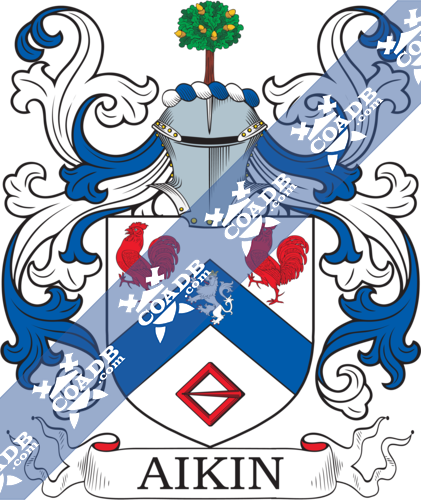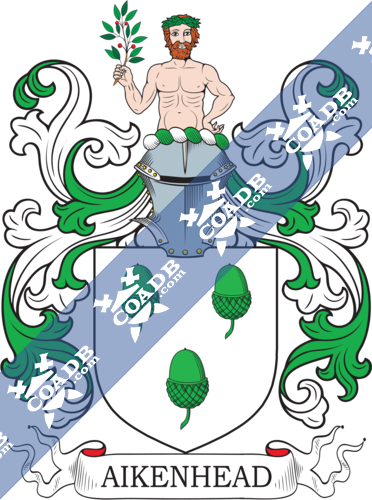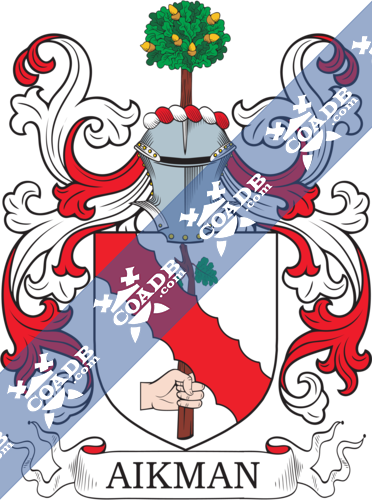Aikin Family Crest, Coat of Arms and Name History

Aikin Coat of Arms Gallery
Don’t know which Coat of Arms is yours?
We can do a genealogical research. Find out the exact history of your family!
Learn MoreAikin Origin:
England, Scotland
Origins of Aikin:
This unique Scottish name acquires from “Ad,” a pet form of the Hebrew male given name “Adam,” which means “red earth,” the element from which the first man was created, and the Olde English pre 7th Century little addition of “-kin.” The surname first appears in the early 15th Century, and Andrew Atkin shows as an observer in Aberdeen in 1469. Since the mid-17th Century the name has been popular in north-east Ulster, the earliest associate being to William Ekyn, lessee on the Cunningham estate in 1613. In the new era, the surname has many various spellings such as Aiken, Aicken, Aikin, Aitkin, Aitken, Atkin, Aickin and Aitin. In September 1590, Violet Aiken married George Young at South Leith, Midlothian, and Agnes, daughter of John Aiken, named in February 1610, at Dalkeith, also in Midlothian. Some distinguished name ancestors were Dr. Joseph Aiken, the author of “Londerias,” described in verse of the siege of Derry from a Protestant defender’s point of view, published a few years after that event and also Frank Aiken, Irish Minister for External Affairs, whose work at the United Nations was important.
Variations:
More common variations are: Aickin, Yaikin, Aikina, Aikine, Aaikien, Aikinn, Aaikin, Aikain, Auikin, Ikin.
Scotland:
The surname Aikin first appeared in Lanarkshire, an old division in the central Strathclyde area of Scotland, now separated into the Council Areas of North Lanarkshire, South Lanarkshire, and the City of Glasgow, where they originated in the old barony of Akyne. One of the first records of the name was Atkyn de Barr in 1340 and next in 1405 when named “John of Akyne, a Scottish dealer requested for the return of his ship and goods was illegally arrested in England.” The name and all its alternatives are derivatives of Adam, created from ‘Ad, ‘the shortened form of Adam + ‘kin.”
The very first recorded spelling of the family was shown to be that of John Akyne, dated about 1405, in the “Records of Scotland.” It was during the time of King Robert who was known to be the “The Stuart,” dated 1371-1420. The origin of surnames during this period became a necessity with the introduction of personal taxation..
Ireland:
Many of the people with surname Aikin had moved to Ireland during the 17th century.
United States of America:
Some of the people with the name Aikin who arrived in the United States in the 19th century included Abel Aikin, who arrived in New York in 1804. David Aikin, who landed in Allegany (Allegheny) Division, Pennsylvania in 1807. John Aikin arrived in New York in 1812. Joseph Aikin at the age of 29, landed in Delaware in 1812. John Aikin, who arrived in New York, NY in 1816.
Canada:
People with the surname Aikin settled in Canada in two different centuries respectively in the 18th and 19th. Some of the individuals with the surname Aikin who came to Canada in the 18th century included Charles Aikin settled on St. John Island in 1775. William Aikin, who landed in Nova Scotia in 1775.
Here is the population distribution of the last name Aikin: United States 1,227; Brazil 175; Canada 131; England 70; New Zealand 66; Australia 61; Kazakhstan 29; Russia 25; Indonesia 12; India 11.
Notable People:
Francis Aickin (died 1805), was an Irish actor, who worked at the Edinburgh Theatre in Scotland, and between the year 1765 and 1792 in the theaters in the West End of London.
George Ellis Aickin (1869-August 1937) was a British Anglican priest bishop in Australia, where he retired from his job as an administrator of Melbourne.
Sir Keith Arthur Aikin, KBE, QC, (February 1916–June 1982), was an Australian justice. He was a Justice of the High Court of Australia.
Blazons & Genealogy Notes
(Liverpool). (as maternally descended from the family of Macdowal) Motto—Sub robore virtus. Ar. on a chev. az. betw. two cocks in chief and a buckle in base gu. a lion ramp. of the field crowned or. Crest—An oak tree vert.







